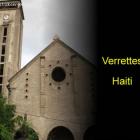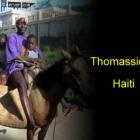ADVERTISEMENT
immigration
Immigration is a major issue among Haitian. It is estimated that over 4 million Haitians are currently living outside of Haiti
Haitian-Americans Wrestling To Support Their Own Mormon Republican Mia Love
Mia Love, was born in Brooklyn to parents who came from Haiti in the mid-1970s. She has defeated Democrat candidate Doug Owens in the recent contest after a hard-fought competition in Utah's 4th Congressional District. She pulled away 50% of the votes, leaving 46% for Owens. Mia Love is not only the first Haitian-American elected to Congress, she is also the first black woman running as a Republican to be elected to Congress and the first Mormon woman in Congress. Mia Love is a Mormon Republican from Utah, she will be the Republican's first black female member of Congress when she visits Washington in the new year. However, despite her historic achievement, the Haitians are in dubious mind to support Mia Love on the ground of her contentious political views and religion. 'Mormonism' has a historic uneasy relationship with traditional Christianity as it differs on their status of God and their beliefs with the traditional branches of Christianity like Roman Catholic Church, Eastern Orthodox Church, and most branches of Protestantism.
All Five Dominican Consulates in Haiti closed until further notice
The Dominican authority has made the decision to close all its consulates in Haiti following the incident that took place recently where some people entered one of their consulates in Port-au-Prince and removed their flag. The Dominican government wants that the Haitian government to give them full guarantee that similar incidents will not take place before they open their consulates.
On the other hand, Castillo Seman from Dominican Liberation Party (PLD), wants every single Dominican currently living in Haiti to pack their bags and return to the Dominican Republic. The Dominican Liberation Party (PLD) has become very influential in the current government. Their influence on the issue of immigration has strengthened in the administrations of former President Leonel Fernandez and in the current administration of President Danilo Medina.
IOM to help Haiti develop national migration policy
An estimated 2.5 million Haitians are living outside of the country in other locales such as the U.S., Cuba, Canada, France, Africa, and other countries of the Caribbean and Latin America. The high rate of migration has much to do with the fact that some 80% of the Haitian population lives below the line of poverty and only half of these people are employed. In May 2014, the IOM put forward certain recommendations on the issue of migration towards helping to develop a policy for the phenomenon in the country.
The need for such a policy was outlined by Pier Rossi Longhi, the Immigration and Border Management Specialist for the Americas. He said that without a reform that was comprehensive, the factors that push people to leave the country in droves would continue. When these factors meet with lax border control and migration management, the economy of the country suffers as skilled, learned and able workers leave for better opportunities in other countries. The problem is also not helped because the economic system now in place doesn't know how to effectively harness the power of remittances to grow the economy.
Jetta Baptiste, Bahamas immigration policies criminalized persons of Haitian descent
Following closely in the footsteps of the Dominican Republic, the Bahamas recently issued a new immigration policy that would make criminals of hundreds of Haitians who live and work in their country. As a result of this decision, activists have mobilized and joined voices in protest of the new regime.
The Bahamian government followed up their new ruling by performing immigration raids throughout the New Providence area, resulting in the apprehension of over 70 people, a number which is said to include an un-told amount of children. This news has sparked great controversy, seeing as some of these persons were in the process of being naturalized, and some of the children were born in the country, though their parents were illegal residents.
Homeland Security to implement Haitian Family Reunification Parole Program
As of early next year, scores of Haitians, waiting to be reunited with their families who reside legally in the United States will be given the opportunity to do so through the scheduled Haitian Family Reunification program being instituted by the Department of Homeland Security. The aim of the program is to hasten the migration of qualified Haitians whose petitions have been granted, but who have been in limbo for years.
According to the U.S. Citizenship and Immigration Services, those eligible will be able to enter the U.S. and reside for about two years before the priority dates for their immigrant visas become current. It was made possible under a legal authority modeled after the 2007 Cuban Family Reunification Parole program. It gives authority to the Secretary of Homeland Security to bring these displaced individuals into the U.S., on a per-case basis, for humanitarian or socially beneficial reasons.
Operation Sea Signal saved Haitian/Cuban Refugees
Around the time Haitian President Aristide returned to Haiti from exile in the U.S. violent opposition forces forced Haitians to flee the country to sanctuary in the U.S. To deal with the migration, the U.S. formed Operation Sea Signal, using its U.S. Coast Guard and Navy units to rescue migrants bobbing in the ocean and transport them to Guantanamo Bay Naval Station.
Army Command Sgt. Maj. Michael Poll, a young but already seasoned soldier, worked with the Joint Task Force 160 (JTF), responsible for the welfare of over 50,000 migrants. The resettlement camp operated from August 1994 up until February 1996.
Department of Homeland Security to implement Haitian Family Reunification Parole Program
Haitian Family Reunification Program begins in 2015. At the beginning of 2015 the Department of Homeland Security (DOHS) will begin the long-awaited Haitian Family Reunification Parole (HFRP) Program. It has been designed for designated, qualified Haitian relatives of U.S. citizens and legal permanent residents living in the U.S. as well.
The HFRP Program is an expedited process that will permit those who have petitioned for a family-based visa and been approved to come to the U.S. But a caveat applies: their priority dates must not exceed two years to receive the visas. As of now, under immigration rules an annual cap of 100,000 Haitians admitted to the U.S. is applied, so there are still many with approved petitions that are languishing on waiting lists that extend to over 12 years.
U.S. Homeland Security to Introduce Haitian Family Reunification Program
The Obama administration has authorized U.S. Department of Homeland Security to start the Haitian Family Reunification Parole (HFRP) Program to fast-track reunification of qualified Haitian relatives of U.S. citizens. About 100,000 Haitians have applied for U.S. visas, but the HFRP Program restricts issuance to those with only a two-year wait. Upon arriving in the U.S. immigrants will qualify for a work permit, while waiting for a green card.
Advocates for immigrants have received news of HFRP Program's future implementation with pleasure, but as Executive Director of Americans for Immigrant Justice, Cheryl Little, commented she had hoped ". . . it wouldn't be as restrictive . . . in terms of which Haitians . . . are eligible to join their loved ones here, but . . . it's going to benefit a number of Haitian families, who have been waiting for this since the earthquake."
Bahamas New xenophobic immigration rule toward foreigners and Haitians
According to U.S. anthropology professor Bertin Louis, the new policy on immigration that's to be effected by the Government of Bahamas from November 1. 2014, is clearly 'xenophobic' because it does not give any opportunity to claim asylum. Under the new immigration laws, the Government of The Bahamas will no longer accept any application of work visas from persons living in Bahamas illegally. In the middle of September, Foreign Affairs and Immigration Minister Frederick Mitchell has said that persons without any legal status will not be permitted to work in Bahamas anymore and those intending to do so will be will be arrested, charged and deported. Any foreigner living in the Bahamas must have a valid passport of own home country. The children of the immigrants (with population around 370,000), if can confirm their legal status of residence, will be allowed to live, attend schools, and work in the islands.
No work permits to Haitians without legal status in the Bahamas
Bahamian authorities are about to take a zero tolerance stance with their new immigration restrictions. Following a string of arrests spanning from August 19, 2014 to as recently as September 17, the government of the Bahamas is considering changes that will greatly impact the urge many Haitians have to flee to the more prosperous country.
The numbers are uncertain, but it was estimated in 2009 that there were about 50,000 illegal Haitian settlers in the Bahamas. Attempting the address that, the Bahamian Government may adapt measures that will make it harder for migrant workers to settle there. One new rule, which went into immediate effect, was that work permits will no longer be issued to those with an illegal status in the country. An illegal who applies for one will also be arrested and deported. Other measures being considered are a permanent ban on the bestowing of legal status to anyone who has ever been deported from the country and additional fees for any Haitians seeking permits to work in the Bahamas. They may also be required to make an in-person application at the Bahamas Embassy in Haiti. The possible changes have been presented to the Haitian ambassador in the Bahamas, and will be discussed with other Haitian officials.
Our objective is to share with you news and information about Haiti and the people of Haiti. Traditions, habits and the way we were or grew are alive in this site. We highly recommend that you Subscribe to our Newsletter and also share with us some of the things that are memorable and made us unique people.

 Verrettes, Haiti
Verrettes, Haiti  Newsletter
Newsletter  Thomassique, Haiti
Thomassique, Haiti  Life After Death
Life After Death  Maissade, Haiti
Maissade, Haiti